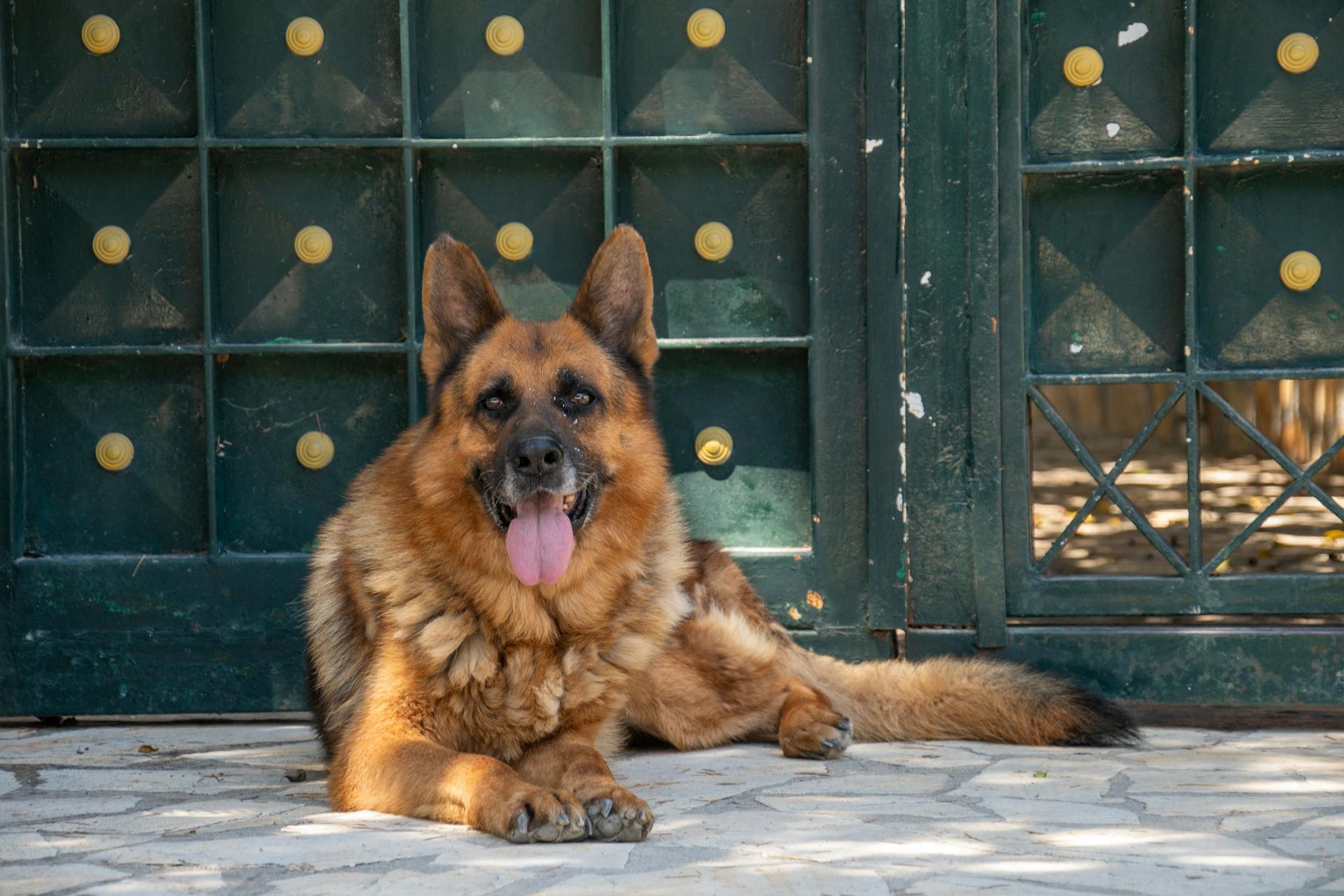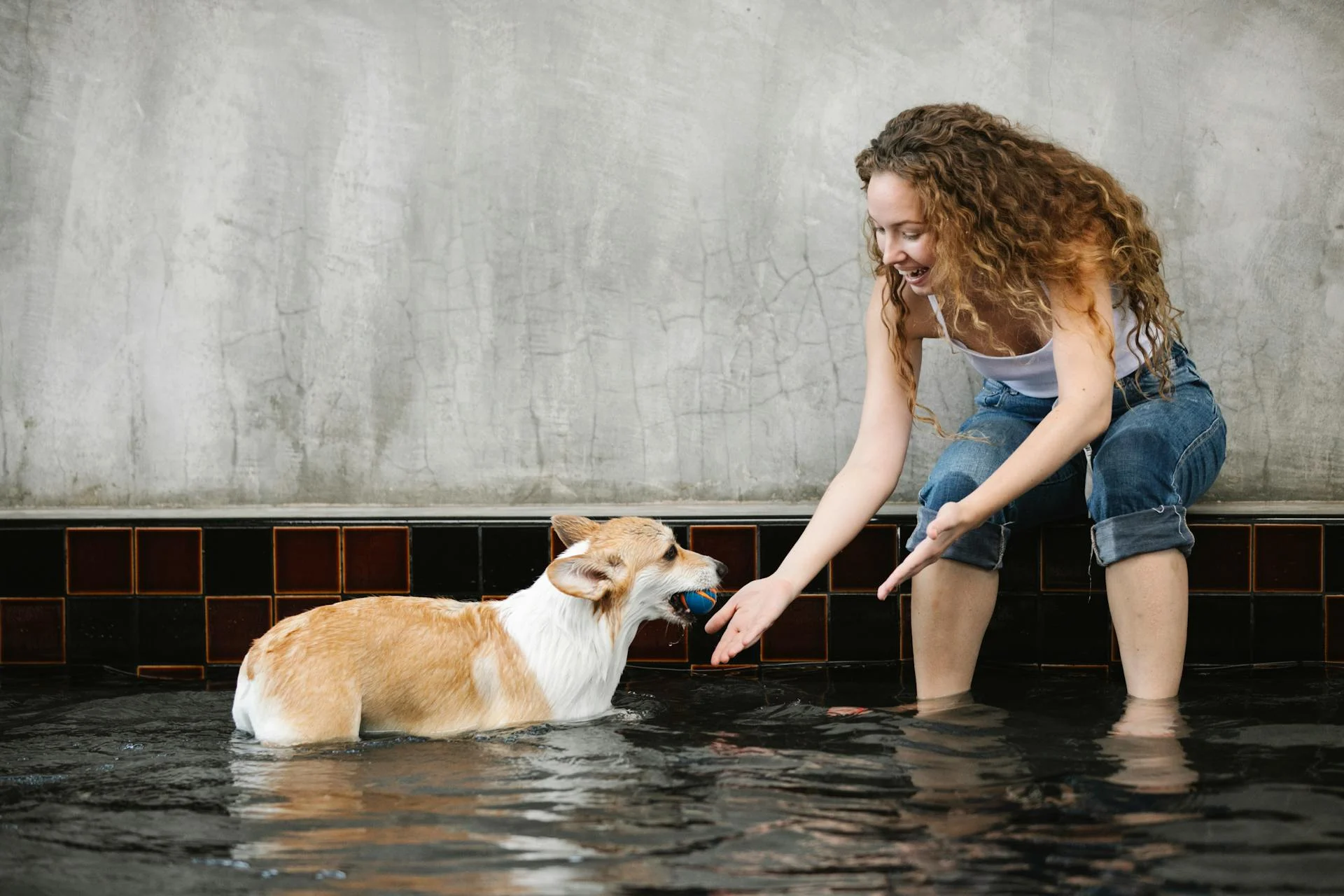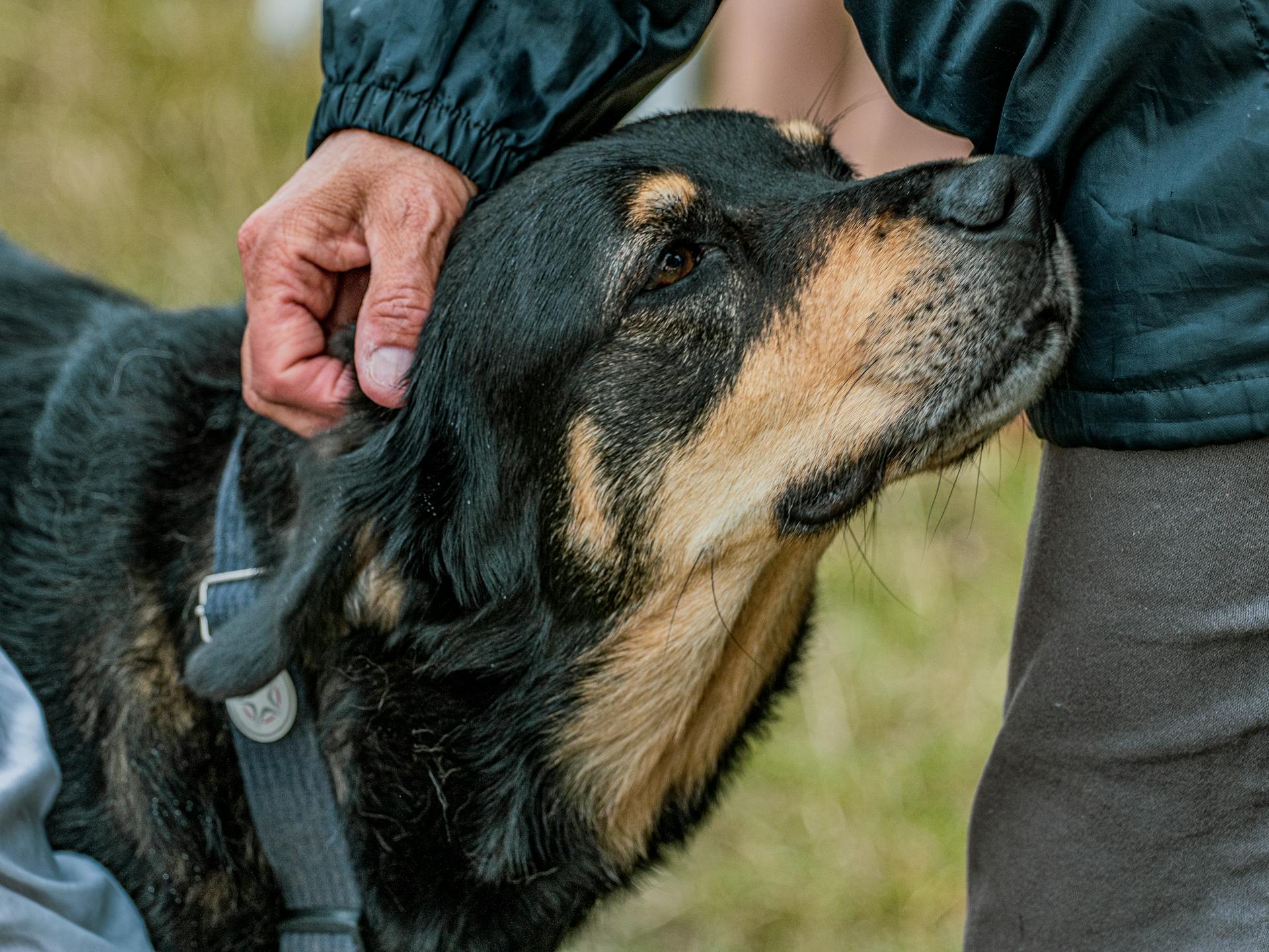
German Shepherds are known for their high energy levels and strong herding instincts, which can make them seem like they're always "on the go." This is especially true for puppies, who can be a whirlwind of activity from the moment they wake up.
As they mature, German Shepherds typically enter a period of rapid growth and development, during which they may become even more energetic and restless. This is because they're burning off excess energy and learning to channel their impulses in a productive way.
A German Shepherd's energy levels are influenced by their genetics, upbringing, and individual personality, so it's not uncommon for them to be more or less energetic than others in their breed. With proper exercise, training, and care, however, most German Shepherds can learn to calm down and become well-behaved companions.
Understanding German Shepherds
German Shepherds are intelligent dogs that require proper socialization and training from an early age to mold their behavior. They typically reach maturity around 3 years old, showing less hyperactivity and more calmness.
Originally bred for herding and protecting sheep, German Shepherds showcase their versatility. This background helps explain their strong work ethic and loyalty.
As a breed, German Shepherds have a natural protective instinct, which can be a double-edged sword. With proper training and socialization, this instinct can be channeled into a strong sense of loyalty and protection for their family.
Every dog is different, and German Shepherds are no exception. Some may calm down faster than others, but with enough exercise and mental stimulation, they can become calmer adult dogs.
Exercise by Age
As your German Shepherd grows, their exercise needs change. For puppies under 1 year old, daily exercise is essential, with 30-60 minutes of walking and 10 minutes of running.
It's crucial to remember that puppies need gentle exercise to prevent damage to their bones and joints. As they grow, their exercise needs increase, with adult German Shepherds requiring at least 60 minutes of daily exercise.
A German Shepherd's age determines their exercise needs, and it's essential to know these limits to prevent overexertion. Here's a breakdown of exercise needs by age:
As your German Shepherd ages, their exercise needs decrease, but it's still essential to provide them with regular physical and mental stimulation.
Training and Behavior
Training a German Shepherd requires patience, consistency, and positive reinforcement. It's essential to understand that these dogs respond well to consistent and positive training methods.
To train an out-of-control German Shepherd, you'll need to implement regular training sessions to reinforce obedience and good behavior. This can be achieved through the use of treats, toys, and praise to encourage desired behavior.
German Shepherds are intelligent, loyal, and protective, but they can also exhibit behavioral issues such as separation anxiety, aggression, and destructive behavior. By understanding these behaviors, you can better support your furry companion and create a harmonious relationship.
A good behavior training program emphasizes structure and consistency, making your German Shepherd's world more predictable. Consistency is key when teaching your dog calmness in the house, and the more consistent you are with your training and expectations, the less chance your dog will misbehave.
Readers also liked: Are German Shepherds Good for First Time Owners
To calm down a German Shepherd, you can try providing mental stimulation through interactive toys and puzzles, teaching basic commands and cues to redirect their focus and energy positively, and ensuring they receive enough physical activity to expend their energy constructively.
Here's a breakdown of the key factors that contribute to a German Shepherd's level of calmness:
It's essential to remember that every dog is different, and some may calm down faster than others. However, with enough exercise and mental stimulation, your German Shepherd can become a calmer adult dog.
Age-Related Development
German Shepherds are a dynamic breed, and their development is closely tied to their age. Puppies between four and six months old are still energetic, but their attention span is longer, making training easier.
As they mature, German Shepherds start calming down around 3 years old due to maturity. Good training can expedite this process, making them calmer at an earlier age.
Exercise plays a significant role in managing their energy levels and contributing to a calmer demeanor. German Shepherds need plenty of physical activity to stay healthy and happy, with the amount of exercise depending on their age, size, and lifestyle.
Here's a breakdown of the exercise needs for German Shepherds by age:
German Shepherds are considered fully mature and emotionally stable at around 3 years of age.
Behavioral Issues and Solutions
German Shepherds are known for their intelligence, loyalty, and protective nature, but they can also exhibit behavioral issues that can be challenging for their owners to manage.
Common behavioral issues in German Shepherds include separation anxiety, aggression, destructive behavior, and excessive barking. These issues can arise due to a variety of reasons, such as boredom, anxiety, or lack of proper training.
To manage these issues, it's essential to identify the triggers and provide mental stimulation through interactive toys and puzzles. Consistency is key, so establishing a routine can help curb destructive behavior.
Here are some common out-of-control German Shepherd problem behaviors and their solutions:
Realize that your German Shepherd's uncontrollability might not be a permanent issue, but rather a phase. Around 6 to 7 months of age, sexual maturity takes place, and your dog may act out due to hormonal changes. This phase can last until around 12 to 18 months old, during which time your dog may exhibit behaviors like not coming back when called, being less easy to control, and refusing to perform commands.
Calmness and Quiet
Rewarding calm behavior is key to teaching your German Shepherd to calm down. You can do this by offering treats and praise when your dog remains quiet during exciting situations. This encourages future quiet behavior and helps your dog learn that being calm is a good thing.
To recognize calm body language, look for signs such as a relaxed face, ears, and tail, as well as a calm stance. You can also reward your dog for calming themselves down after getting excited. This helps your dog learn to regulate their emotions and respond to stressful situations in a calm manner.
Expand your knowledge: Bernese Mountain Dogs Calm
By creating a calm environment and rewarding calm behavior, you can help your German Shepherd learn to calm down and become a more relaxed companion. Remember, consistency and patience are key when teaching your dog new behaviors, and with time and practice, your German Shepherd can become a calm and well-behaved companion.
Consider reading: How to Calm a Hyper Dog with Herbs? Natural Solutions for Pups
Do Shepherds Calm Down?
German Shepherds can and do calm down with age. Their boundless energy as puppies needs to be channeled through training and exercise.
Every dog is different, and some German Shepherds may calm down faster than others. With enough exercise and mental stimulation, they can become calmer adult dogs.
German Shepherds typically reach maturity around 3 years of age, showing less hyperactivity and more calmness. This is a key factor in their level of calmness.
Proper socialization and training during their early stages are crucial in molding their behavior. This helps them become calm, happy companions.
Exercise, training, and management are the key to helping your German Shepherd calm down. With dedication to consistent training, you can see a significant difference in their behavior.
Expand your knowledge: How to Calm down Puppy Zoomies
Teaching Calmness
Teaching calmness is crucial for any dog, especially high-energy breeds like German Shepherds. Ignoring unwanted behavior is a major consequence for most German Shepherds.
To redirect your dog's energy, immediately ask for another wanted behavior while ignoring what your dog has offered. This can be as simple as asking for a sit or down when they're jumping.
Avoid the battle! Out-of-control German Shepherds love to get you excited. Instead, stay calm and refuse to get engaged physically or verbally. Fold your arms, look away from him, and walk out of the room if possible.
Hand-feeding your dog their meals is a valuable life lesson and a perfect way to raise the value of interaction with all people. This simple training builds trust in your dog while showing him that only calm behaviors get the reward.
Here are some ways to teach calmness to your German Shepherd:
- Redirect him to a calm behavior
- Avoid engaging in a battle
- Hand-feed your dog their meals
Reward your dog for being calm, especially in situations that would normally trigger excitement. Offer a treat and calmly praise him for remaining quiet. This encourages future quiet behavior and helps your dog associate calmness with positive outcomes.
Prevention and Planning
Having a German Shepherd can be a wonderful experience, but it's essential to remember that they are a powerful and athletic breed that requires consistent training and care. You must use a variety of techniques to help change your dog's uncontrollable behavior.
To prevent your German Shepherd from becoming unruly, it's crucial to include the right type of exercise at the right times. This can help to burn off excess energy and reduce stress. You can try taking your dog for a walk, run, or playtime in the park to get them moving.
A well-planned routine is also vital for keeping your dog's mind calm. Mental challenges can help to reduce anxiety and stress, and can be as simple as hiding treats or toys around the house for your dog to find. You can also try providing your dog with puzzle toys filled with their favorite treats.
Consistency is key when it comes to training your German Shepherd. You need to stay consistent in your discipline and how you respond to your dog's behavior. This means setting clear rules and boundaries, and ensuring that everyone in the household is on the same page.
For your interest: Is It Okay to Give My Dog Calming Treats Everyday
Here are some essential tools to help you manage your German Shepherd's behavior:
- Leashes can be used for the "umbilical cord" training technique, which prevents your dog from being reinforced for unwanted behaviors.
- Tethers can be used to keep your dog close to you, reducing the likelihood of them getting into trouble.
- Positive reinforcement techniques, such as clicker training, can help to encourage good behavior and reduce bad behavior.
By following these tips and staying consistent, you can help to prevent your German Shepherd from becoming unruly and reduce stress in your household. Remember, it's always better to spend a few months helping to teach your dog new behaviors than to let them ruin your house and stress you out.
Observe Your Dog
Observe your German Shepherd closely, especially during the day, and reward calm behavior with treats. This will help them learn to associate calmness with positive reinforcement.
Place small, tasty treats in a Ziploc bag and keep it in your pocket. Anytime you see your German Shepherd exhibiting calm behavior, especially when they're tempted to get excited, reward them calmly with a treat.
As you observe your German Shepherd, you'll notice they're still a puppy at 10 to 16 weeks old. This age is all about mischief and teething, making it hard for them to calm down.
Teething can last quite a while, so be patient and generous with your German Shepherd's behavior. It's essential to remember that they're still in puppy adolescence and testing boundaries.
Key Takeaways
German Shepherds typically calm down around 2-3 years of age, but it varies based on individual factors.
Consistent training and proper exercise are essential for a calm German Shepherd. This is especially true for high-energy breeds like German Shepherds.
To calm down a German Shepherd, provide mental stimulation and create a calm environment. This can be as simple as providing a quiet space for your dog to relax.
Positive reinforcement training is also crucial for a calm German Shepherd. Reward your dog for good behavior, rather than punishing them for bad behavior.
Proper exercise is also vital for a calm German Shepherd. Aim for at least 30 minutes of exercise per day, and consider activities like agility training or long walks.
Here are some key factors to consider when trying to calm down a German Shepherd:
- Mental stimulation
- Calm environment
- Positive reinforcement training
- Proper exercise
Frequently Asked Questions
At what age does a German Shepherd stop being a puppy?
A German Shepherd typically stops being a puppy between 2 to 3 years of age, with males maturing later than females. This age range allows them to reach full physical and mental maturity.
Sources
- https://www.shepherdsense.com/how-to-control-a-german-shepherd/
- https://gsdcolony.com/blogs/news/are-german-shepherds-high-energy-dogs
- https://wagwalking.com/training/train-a-german-shepherd-to-be-calm
- https://arkanimalkingdom.com/when-do-german-shepherds-calm-down/
- https://wildearth.com/blogs/dog-knowledge/when-do-puppies-calm-down
Featured Images: pexels.com


